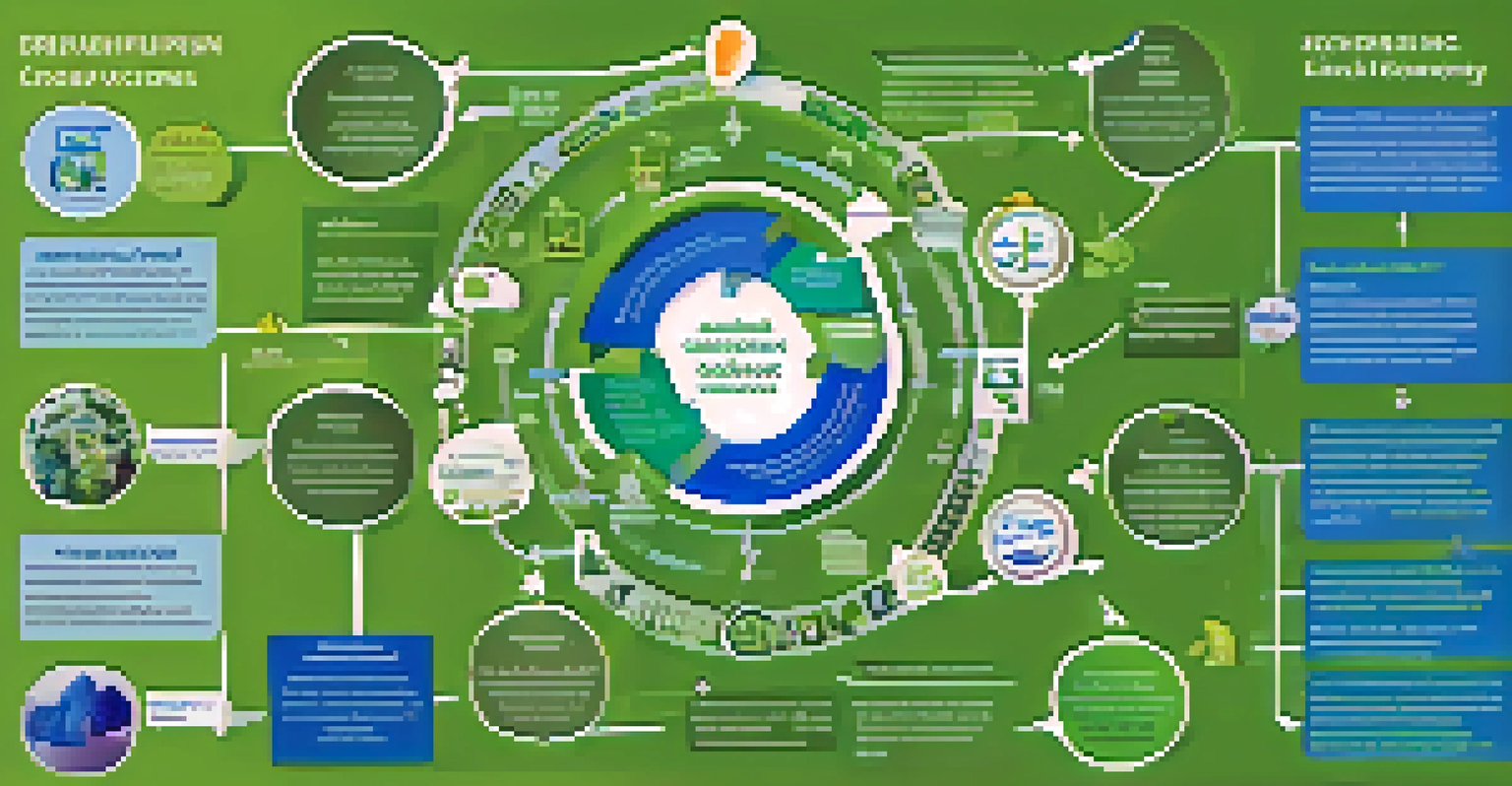Sustainable Supply Chains: Innovations for Modern Businesses

Understanding Sustainable Supply Chains and Their Importance
Sustainable supply chains focus on minimizing environmental impact while maximizing efficiency. This approach not only benefits the planet but also enhances a company's reputation and profitability. By implementing sustainable practices, businesses can meet the growing consumer demand for eco-friendly products and services.
Sustainability is no longer about doing less harm. It's about doing more good.
As consumers become more environmentally conscious, they often prefer brands that demonstrate responsibility in their supply chains. Companies that adopt sustainable practices can differentiate themselves in a crowded marketplace, attracting loyal customers who share similar values. This shift in consumer behavior underscores the importance of sustainability for modern businesses.
Additionally, sustainable supply chains can lead to cost savings over time. By optimizing resource use and reducing waste, companies can lower operational costs while simultaneously contributing to a healthier planet. This dual benefit illustrates why sustainability is not just a trend but a necessary strategy for long-term success.
The Role of Technology in Sustainable Supply Chains
Technology plays a pivotal role in driving sustainability within supply chains. Innovations such as blockchain and IoT (Internet of Things) facilitate transparency and traceability, allowing businesses to monitor their supply chain practices in real time. This visibility helps companies identify inefficiencies and implement improvements.

For example, blockchain technology ensures that every step of the supply chain is recorded securely, making it easier to track the sourcing of materials. This level of transparency not only builds trust with consumers but also helps companies ensure ethical sourcing practices. By leveraging technology, businesses can make informed decisions that align with their sustainability goals.
Sustainability Boosts Brand Loyalty
Consumers increasingly prefer brands with responsible supply chains, enhancing loyalty and market differentiation.
Moreover, digital tools can optimize logistics, reducing carbon footprints associated with transportation. Route optimization software can lead to shorter delivery times and lower fuel consumption, further enhancing the sustainability of supply chains. Embracing technology is crucial for businesses looking to innovate and stay competitive in today's marketplace.
Circular Economy: Redefining Supply Chain Practices
The concept of a circular economy encourages businesses to rethink traditional supply chain models. Instead of a linear process where products are made, used, and discarded, a circular approach focuses on reusing and recycling materials. This shift can significantly reduce waste and resource consumption.
The circular economy is not just a concept; it’s a new way of thinking about how we create value and protect the planet.
For instance, companies can design products that are easier to disassemble, allowing for the recovery of valuable materials. By creating a closed-loop system, businesses can minimize their reliance on virgin resources and reduce their environmental impact. This innovative approach not only benefits the planet but can also lead to cost savings in the long run.
Transitioning to a circular economy requires collaboration among stakeholders, from suppliers to customers. Businesses must educate consumers about their role in the process and encourage responsible consumption habits. By fostering a culture of sustainability, companies can create a more resilient supply chain that responds to the challenges of a changing world.
Sustainable Sourcing: Building Ethical Partnerships
Sustainable sourcing is a crucial aspect of creating a responsible supply chain. This practice involves selecting suppliers who prioritize environmental and social responsibility, ensuring that every link in the chain upholds ethical standards. By fostering these partnerships, businesses can enhance their overall sustainability efforts.
For example, a company might choose to source materials from local suppliers who use eco-friendly methods. This not only reduces transportation emissions but also supports local economies. Establishing strong relationships with suppliers can lead to innovative solutions and improved practices throughout the supply chain.
Technology Drives Supply Chain Efficiency
Innovations like blockchain and AI enhance transparency and optimize operations, making supply chains more sustainable.
Moreover, transparent communication with suppliers is key to maintaining ethical standards. Businesses should engage in regular assessments and audits to ensure compliance with sustainability goals. By doing so, companies can build a more resilient supply chain that aligns with their values and meets consumer expectations.
Employee Engagement: The Key to Sustainable Practices
Employee engagement is vital for the success of sustainable supply chains. When employees understand the importance of sustainability and feel empowered to make a difference, they are more likely to contribute to innovative practices. This involvement can lead to a culture of sustainability within the organization.
For instance, companies can offer training programs that educate employees about sustainable practices and encourage them to share ideas. By creating a platform for open dialogue, businesses can tap into the creativity and passion of their workforce. Engaged employees often become advocates for sustainability, driving initiatives that align with company goals.
Additionally, recognizing and rewarding sustainable efforts can further motivate employees. By celebrating achievements, businesses reinforce the importance of sustainability in their operations. This positive reinforcement fosters a sense of ownership and commitment, ultimately leading to a more effective and sustainable supply chain.
Measuring Sustainability: Key Metrics and KPIs
To ensure the effectiveness of sustainable supply chains, businesses must establish key performance indicators (KPIs) and metrics. These tools allow companies to track their progress and identify areas for improvement. By measuring sustainability efforts, organizations can make informed decisions that drive positive change.
Common metrics include carbon footprint, energy consumption, and waste reduction rates. By analyzing these data points, companies can assess the impact of their sustainability initiatives and adjust strategies as needed. This analytical approach not only enhances accountability but also demonstrates a commitment to transparency.
Circular Economy Redefines Practices
Shifting to a circular economy encourages reuse and recycling, significantly reducing waste and resource consumption.
Furthermore, sharing sustainability metrics with stakeholders can build trust and credibility. By being open about progress and challenges, businesses can foster a sense of community and collaboration. This transparency encourages continuous improvement and reinforces the importance of sustainability in supply chain management.
Future Trends in Sustainable Supply Chain Innovations
As businesses continue to adapt to the evolving landscape of sustainability, several trends are shaping the future of supply chain innovations. One notable trend is the increasing adoption of renewable energy sources, as companies seek to reduce their carbon footprints. By investing in solar, wind, or other renewable energy options, businesses can significantly enhance their sustainability efforts.
Another emerging trend is the use of artificial intelligence (AI) in supply chain management. AI can optimize operations by predicting demand, analyzing data, and identifying inefficiencies. This technology has the potential to revolutionize supply chains, making them more agile and responsive to changing market conditions.

Finally, the growing emphasis on social responsibility will drive businesses to prioritize ethical practices throughout their supply chains. As consumers demand greater transparency and accountability, companies must adapt to these expectations. By embracing these trends, businesses can not only enhance their sustainability efforts but also position themselves as leaders in their industries.